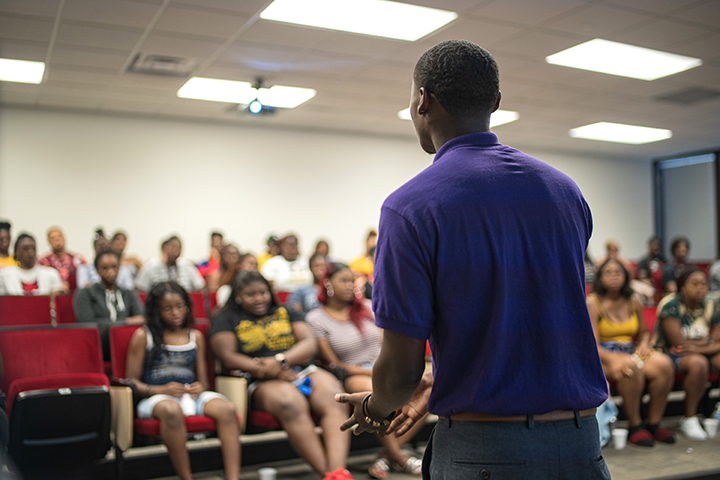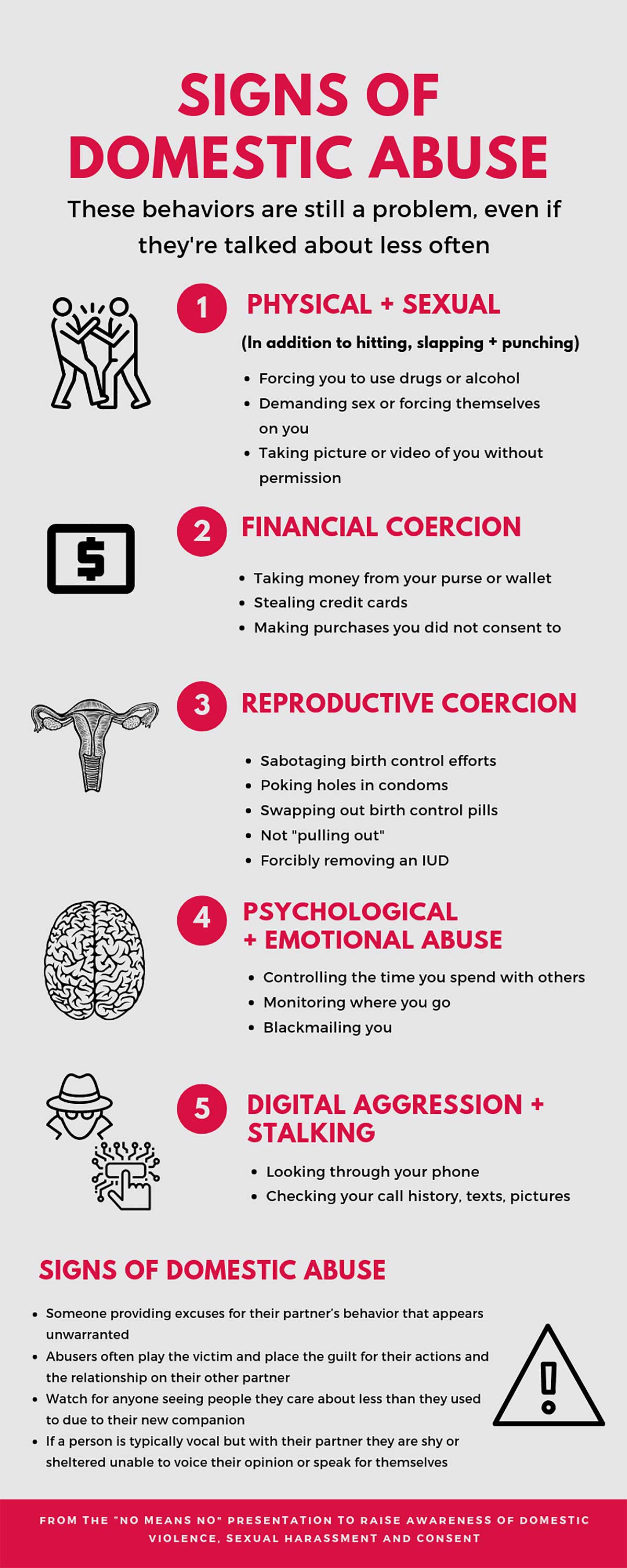Fraternity teaches students about consent

Upsilon Theta Chapter of the Omega Psi Phi Fraternity hosted “No Means No,” a presentation to raise awareness of domestic violence, sexual harassment and consent, Sept.12, in 103 Communication Building.
The event began with a silent exercise where students held a handful of beads and a Styrofoam cup, and read lists posted on the walls. The lists included phrases such as, “Has your partner ever controlled what you wear?” or “Has your sexual assault ever made you want to harm yourself?” If anything on the list matched a personal experience, participants dropped a bead in a cup.
The lists acted as a trigger for some students.
“Some of those got personal,” one said, in tears.
The fraternity showed several videos filmed in a dorm room, with different scenarios. As each scene played out, presenters stopped the video and pointed out specific choices that could be made.
Caleb Love, Dallas junior, paused the clip to point out an actor’s body language.
“If she makes this face right here? That means she don’t want to, bro,” he said. “Once she initially said no, it’s no.”
The actor in the video starts to convince his girlfriend to have sex, even after she said she wasn’t comfortable because she was worried about her roommates coming in — that’s where the line gets crossed, Love said.
“When he starts to talk her into it, it’s coercion and coercion is not consent,” he said.
 Love asked the students what consent really means. Audience members called out answers such as, “Giving permission” or “An agreement on both ends.”
Love asked the students what consent really means. Audience members called out answers such as, “Giving permission” or “An agreement on both ends.”
“There’s no such thing as a playful no,” Tevin Miles, Houston senior, said. “No, not right now, stop — that’s not consent.”
Miles said both people have to be in agreement about what they want to do.
Miles and Love showed the students a popular online video comparing sexual consent to making someone a cup of tea. If you make someone a cup of tea and they don’t want to drink it, it’s not OK to force it down their throat or try to make them drink it while they’re sleeping.
Domestic violence situations almost never start out with a violent incident, it’s usually a build up of unhealthy behaviors over time that leads to explosive behavior, Love said. Many domestic abusers grew up in abusive households.
“If you see signs of a domestic abuser, it’s not going to get better,” Love said. “If you really feel like God wants you to be with this person, get professional help. If he was domestic (abuser) once, if you don’t get professional help, he’s going to get domestic again — or she.”
One fraternity member, whose name has been withheld for privacy reasons, shared a personal story of growing up in an abusive family.
“When I was three, I was riding with my parents to Tyler, Texas,” he said. “It started with verbal abuse.”
He saw his father hit his mother. She called the police and his dad was sent to jail, he said.
“But then my mom got tired of it and she became the aggressor,” he said.
When his mother was pregnant with his sister, the student said she was sent to prison for throwing grease and hot water on his father, and for throwing his possessions outside and burning them with gasoline.
The student said that when he got to middle school, he reflected his parents’ behavior. One time a girl slapped him after he called her a bitch, so he hit her with a desk. He was expelled and had difficulty enrolling in other schools, he said.
Verbal abuse often leads to physical abuse, he said.
“Words really can detect how you perceive something later,” he said. “Men have feelings just like women do. Women have feelings just like men do. One thing I’m gonna say is, the verbal abuse is where it’s gonna start.”
Love described abusive behavior, such as forcing someone to use drugs or alcohol, demanding sex, taking pictures and videos without permission, blackmailing, controlling who their partner spends time with, sabotaging birth control efforts and using their partners’ credit cards without asking.
Marie Murray, Lamar University certified health educator, encouraged students to be pro-social bystanders instead of allowing others to act in violent, abusive ways. If witnesses do not say anything, they are basically enabling the abuse, she said.
Murray asked students to list behaviors that might be unreciprocated, unwanted or coercive, and to describe what creates hostile environments, adding that different groups of students rank harmful behaviors in different ways.
Murrays said anyone experiencing violent, abusive behaviors in their relationships should seek counseling at the Student Health Center.
Miles concluded the presentation with advice for the attendees.
“It’s OK to not be OK,” he said. “But do something about it, go get help. Don’t keep going through the same situation.”
For help, visit the following resources:
National domestic violence hotline — 1-800-799-SAFE, 1-800-787-3224 (TTY)
National Suicide Prevention Lifeline — 1-800-273-8255
LUPD — 409-880-7777
